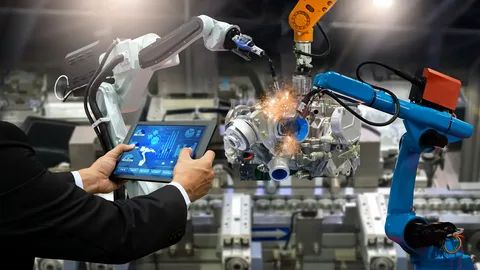Did you know that the automation industry generated $214 billion in 2021? Out of this, $83 billion was generated by industrial automation itself. Since the 1980s, industrial robotics has been soaring high, thus taking manufacturing automation to the next level.
But what is manufacturing automation? What are the benefits of automation in manufacturing? Let’s explore!

What Is Manufacturing Automation?
Manufacturing automation refers to the process of implementing automation in various manufacturing tasks such as processing, inventory management, production planning, etc. With technological advancements, manufacturers and managers are automating manufacturing processes, thus viewing it as a key strategy for growth and productivity.
You would be surprised to know that about 76% of manufacturers use automation on the factory floor to increase productivity. The figures sound surprising, right? Well, the underlying benefits of manufacturing automation are also many.
Benefits of Manufacturing Automation
With manufacturing automation, businesses have experienced a 70% decrease in breakdowns which ends up saving them a whopping 12% on equipment repairs. Sounds surprising, right? Well, there are other benefits of manufacturing automation. Let’s explore them.
1. Reduced Operational Costs
Manufacturing automation reduces the need for manual labor, thus minimizing the chances of human errors and saving up wages, benefits, and training expenses. This way, it helps in reducing operational costs, thus helping businesses optimize their budget and allocate resources effectively.
2. Reduced Factory Lead Times
Factor lead time refers to the time difference between the start and completion of a manufacturing process. With manufacturing automation, manual tasks are eliminated, and machines constantly perform repetitive and time-consuming processes. The best part is machines don’t need breaks like humans.
Thus, manufacturing automation promotes parallel processing, where multiple tasks can be executed simultaneously, reducing the overall time required to complete a product. This reduces factory lead times, thus minimizing bottlenecks and helping businesses meet tight deadlines and fluctuating customer demands.
3. Increased Output
There’s no doubt that machines can work round the clock without taking breaks and getting tired, which makes them more efficient than humans. Moreover, the turnover is also high, thus leading to a higher volume of output within a given time frame. This helps manufacturers maximize their output & productivity, thus enabling them to meet customer demands more effectively.
4. Faster ROI
Implementing automation systems in manufacturing processes typically requires a significant initial investment. However, in the long run, manufacturing automation streamlines production processes, reduces errors, and minimizes rework, leading to cost savings in materials and resources.
Moreover, automation enhances efficiency and productivity by enabling continuous and uninterrupted production. This, in turn, helps manufacturers achieve a faster ROI compared to traditional manual processes.
5. Improved Product Quality
Automation ensures that each product is manufactured according to predefined standards and specifications. The use of advanced sensors, robotics, and computerized control systems allows for precise measurements, accurate cuts, and consistent assembly, resulting in products that meet or exceed customer expectations.
Thus, manufacturing automation enables real-time monitoring and quality control throughout the manufacturing process.
6. Increased Workplace Safety
Automation systems and machines have safety features such as sensors and protective barriers installed in them. These systems play a crucial role in the detection of hazards in real-time, thus ensuring immediate corrective actions. Moreover, as human labor is minimized, the chances of physical injury, chemical exposure, and other occupational hazards are also negligible.
7. Reduced Waste
By implementing manufacturing automation, the chances of human-caused errors and inconsistencies are minimized. Moreover, automation also makes the manufacturing process more efficient, thus ensuring precision and accuracy.
Reduced waste also has a positive impact on the environment. With less material waste generated, fewer resources are consumed, and hence, the carbon footprint associated with manufacturing processes is reduced.
Do you want to automate your manufacturing operations? We bring you QodeNEXT and its unique solutions, which are tailored to meet your unique needs, thus taking your business’s productivity and efficiency to the next level. Unlock the full potential of your business with QodeNEXT’s comprehensive suite of hardware and software solutions. Go check out QodeNEXT’s services now!
FAQ: Manufacturing Automation
1. What is manufacturing automation?
Manufacturing automation refers to the process of implementing automation in various manufacturing tasks such as processing, inventory management, production planning, etc.
2. List some benefits of manufacturing automation.
The benefits of manufacturing automation include increased productivity, improved product quality, reduced labor costs, and enhanced efficiency. Not just this, automation also leads to shorter production cycles, better inventory management, and increased competitiveness in the market.
3. How manufacturing automation leads to faster ROI?
Manufacturing automation leads to faster ROI by reducing labor costs, minimizing errors, increasing output, optimizing resource utilization, and enabling faster delivery cycles.
4. How does manufacturing automation improves productivity?
Manufacturing automation improves productivity by streamlining processes, increasing production speed and efficiency, and enabling continuous operation.
5. How manufacturing automation improves workplace safety?
Manufacturing automation replaces hazardous manual tasks with automated processes and minimizes the risk of accidents and injuries. Moreover, it implements safety protocols and sensors and ensures consistent adherence to safety standards, thus improving workplace safety.
Wrapping Up
The benefits of manufacturing automation cannot be overstated. From increased productivity and efficiency to improved product quality and reduced costs, automation has revolutionized the manufacturing industry. Embracing automation is not just a choice; it’s a necessity for companies seeking to thrive in the modern manufacturing landscape.
If you’re looking for some amazing manufacturing automation solutions, don’t forget to check out QodeNEXT. Get in touch with us now to help you make the best choice to manage your fleet and optimize your process!







